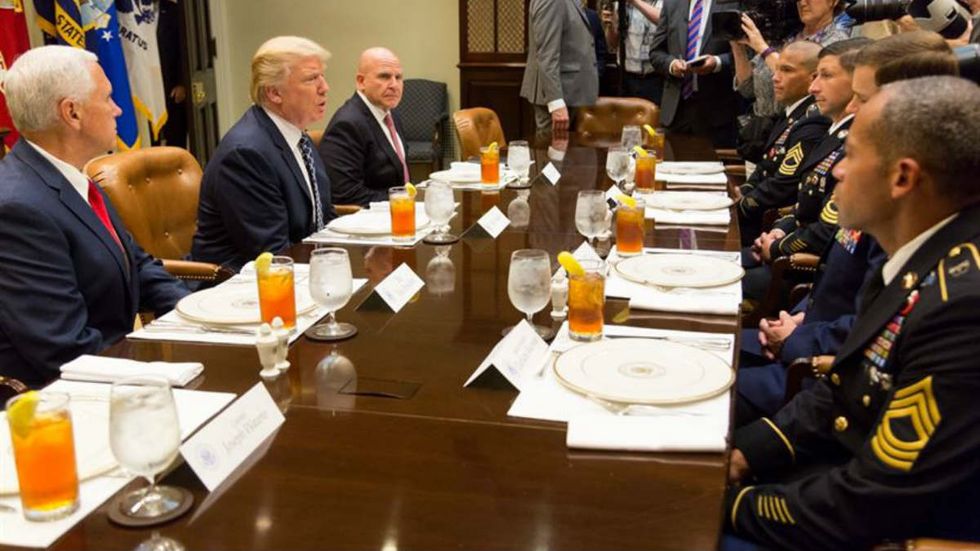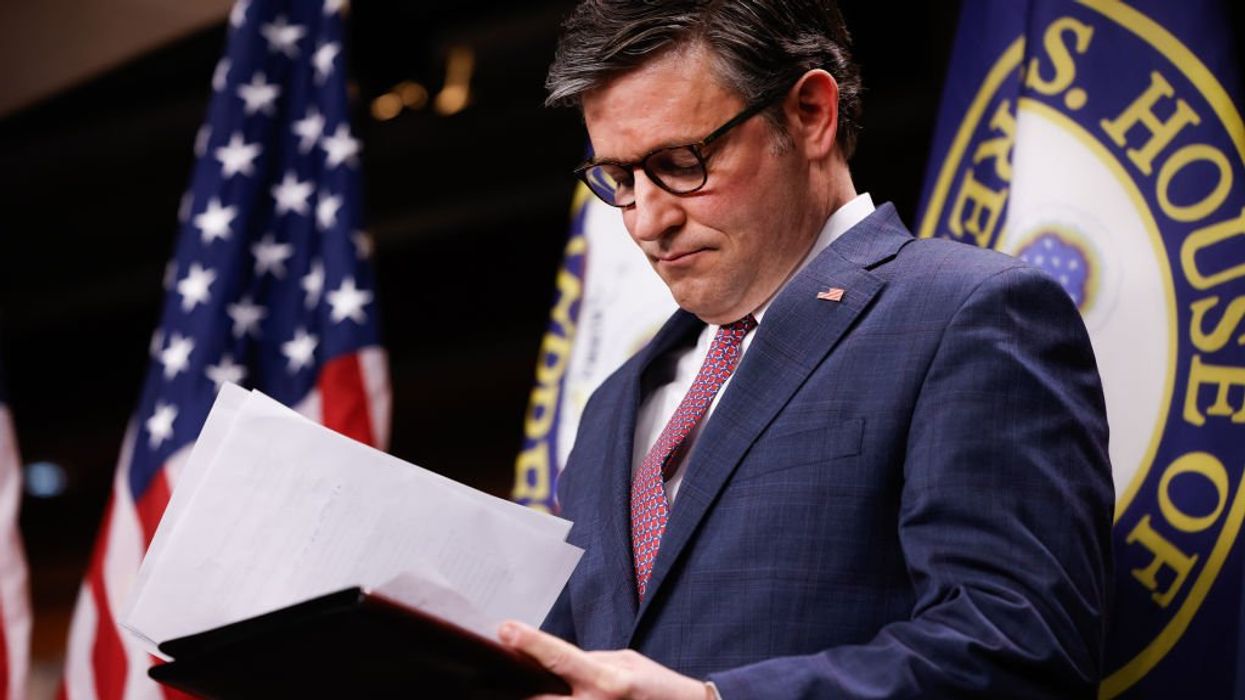
© 2024 Blaze Media LLC. All rights reserved.
On Monday, President Trump released his comprehensive National Security Strategy (NSS), delivering a speech on the document that will likely shape his foreign policy. Conservative Review received an advance copy of the strategy memo prior to the president’s speech.
The NSS is very much Reaganesque in its policy prescriptions, but it’s also formulated to adopt many of President Trump’s proposals that he discussed on the campaign trail and during his first year in office.
Reagan’s Third Term
President Trump’s NSS is remarkably similar to President Ronald Reagan’s 1987 and 1988 strategies. Trump’s borrows from the strategies implemented by President Reagan in his campaign to defeat the Soviet Union.
An entire pillar of the Trump NSS is dedicated to preserving “peace through strength.” This realist approach to foreign affairs recognizes that a dedication to ensuring American hegemony preserves stability and reduces the chance for conflict.
Similar to Reagan, President Trump recognizes that ideological warfare is an essential component of grand strategy. The Trump NSS promises to “deny violent ideologies the space to take root,” and includes “combating the evil ideology of jihadists by exposing their falsehoods, promoting counter-narratives, and amplifying credible voices.”
Both the Trump and Reagan NSS recognize the tools or “elements of national power” that American can use to challenge adversaries and support allies.
Burning down Obama’s sacred cows
President Obama famously refused to recognize that there was an Islamic element to radical jihadist movements that were proliferating the globe during his tenure. Obama took pains to distance Islam from the ideology of terrorist organizations, once famously declaring that “ISIS is not Islamic.”
President Trump refuses to take the politically correct approach. His NSS mentions “radical Islamist” ideologies several times, and details that their ideology calls for a worldwide Islamic caliphate and submission to “Sharia law.”
As many leftist outlets have already reported, the Trump NSS drops “climate change” from threats to national security, promising to counter the “anti-growth energy agenda that is detrimental to U.S. economic and energy security interests.” The Obama NSS claimed that climate change was one of the major threats facing the U.S. and world as a whole.
Principled Realism
President Trump first introduced the concept of Principled Realism in May while delivering his first major foreign policy speech in Riyadh, Saudi Arabia.
“For our part, America is committed to adjusting our strategies to meet evolving threats and new facts. We will discard those strategies that have not worked — and will apply new approaches informed by experience and judgment. We are adopting a Principled Realism, rooted in common values and shared interests,” Trump said in Riyadh.
Principled Realism appears to be a combination of realism and pragmatism. It recognizes that sovereign nations will – and should – put their interests first. Principled Realism announces a departure from the Bush and Obama era, which was linked to Neoconservative and Wilsonian worldviews.
Bush and Obama articulated more of a global standard for international relations. The Trump NSS claims to recognize the world for what it is, not for what it should become.
The 5 major threats
Trump’s National Security Strategy labels (in no particular order) North Korea, Iran, China, Russia, and radical jihadist groups as the chief threats to the United States, detailing the several ways these states seek to undermine America’s standing in the world.
On China, the NSS seeks to roll back China’s criminal behavior against the U.S. The strategy calls out Beijing for stealing “intellectual property valued at hundreds of billions of dollars.”
The NSS recognizes Russia as a nation that seeks to weaken “U.S. influence in the world and divide us from our allies and partners.” However it also remains open to “cooperate across areas of mutual interest with both countries.”
North Korea is “ruled as a ruthless dictatorship without regard for human dignity,” the NSS states, warning about Pyongyang’s growing cyber, nuclear, and ballistic missile programs.
It takes a no-holds barred approach to discussing the destabilizing activities of Iran. “The Iranian regime sponsors terrorism around the world,” the NSS states. “It is developing more capable ballistic missiles and has the potential to resume its work on nuclear weapons that could threaten the United States and our partners.”
The NSS recognizes the threat posed not just by ISIS and al Qaeda, but all jihadi entities that “advance a totalitarian vision for a global Islamist caliphate that justifies murder and slavery, promotes repression, and seeks to undermine the American way of life.”
To combat these rogue actors, Trump’s strategy seeks to lead from the front, while maintaining alliances and military cooperation with nations also threatened by these entities.
Israel is *not* the problem
The Trump NSS thoroughly debunks the misguided notion that Israel is the source for conflict in a region that is consistently plagued with warfare.
“For generations the conflict between Israel and the Palestinians has been understood as the prime irritant preventing peace and prosperity in the region,” the NSS states.
In reality, it is Iran and its caliphatist approach to the region that is contributing to the destabilization, the Trump national security memo determines.
“Today, the threats from radical jihadist terrorist organizations and the threat from Iran are creating the realization that Israel is not the cause of the region’s problems. States have increasingly found common interests with Israel in confronting common threats.”
Immigration and Border Security
Much of the NSS discusses the national security vulnerabilities to America’s immigration and border security system, and articulates a new approach toward implementing a system that protects the interests of Americans first.
The NSS stresses a further dedication to enforcing the immigration laws that are already on the books. It also describes “randomized entry and extended-family chain migration” as “contrary to our national security.”
Want to leave a tip?
We answer to you. Help keep our content free of advertisers and big tech censorship by leaving a tip today.
Want to join the conversation?
Already a subscriber?
more stories
Sign up for the Blaze newsletter
By signing up, you agree to our Privacy Policy and Terms of Use, and agree to receive content that may sometimes include advertisements. You may opt out at any time.
© 2024 Blaze Media LLC. All rights reserved.
Get the stories that matter most delivered directly to your inbox.
By signing up, you agree to our Privacy Policy and Terms of Use, and agree to receive content that may sometimes include advertisements. You may opt out at any time.


